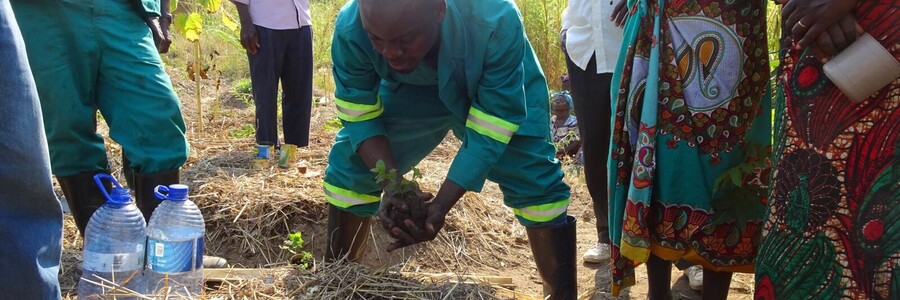The aim of the project is to train smallholder families in the Dynamic Agroforestry method and to support them in implementing this method on their land. To this end, the smallholders are trained to become experts in sustainable cultivation so that they can spread and establish the Dynamic Agroforestry technique in their villages. So far, the subsistence farmers have only used conventional cultivation.
In the workshops, which consist of a theoretical and a practical part, they learn about plants that they will cultivate sustainably in the future and how to care for them properly. They also learn the important backgrounds of why cutting down trees is so harmful to the environment and why sustainable cultivation is so important.
The workshop
On 1 and 2 November, the smallholders participating in the support programme came together for a two-day workshop. There they explored the importance of trees, fuel-efficient cook cookers and alternative fuel sources. They learned about the effects of rapid deforestation in Malawi and that the use of alternative energy sources can counteract global warming. They were also informed about the links between the cutting down of trees and problems such as soil erosion and the drying up of rivers.
In Malawi, most of the forest is still used for the production of coal, as almost all families cook with coal stoves. To mitigate this problem, the participants were taught on the first day of the workshop that instead of using trees from the forests, they can use bamboo as a fast growing biomass provider, recycled briquettes and sustainable charcoal. In the process, the participants seemed very inspired and eagerly exchanged ideas with the team. Overall, they showed great interest in learning more about sustainability and the proper cultivation of bamboo.
There was an open exchange between the team and the participants. The farmers explained why they still cut down and burn the trees otherwise. Until now, they did not know of any alternative way to produce bricks for building houses. Thereupon, everyone looked for solutions for the future together and found and discussed sustainable ways. In the future, they plan to invest in a machine that will be lent from village to village and used for brick production.
On the second day of the workshop, the participants learned how to care for and prune their trees, how to multiply seeds and which seeds are the best choice. The farmers were able to take away a lot of new knowledge so that their trees will grow healthy and be of high quality in the future. At the end of the day, each participant received a biomass cooker and a tree seedling.
Action day: Planting bamboo
Cutting bamboo instead of clearing forests: After discussing the great potential of bamboo as a stable fuel wood supply, farmers planted tree seedlings with the help of the NGO on 6 and 7 December. In the process, they were informed about factors to consider when planting the seeds and how to take care of the bamboo. Each participant was given five bamboo seedlings and could plant them anywhere around the house or field. On the one hand, this provides sustainable cooking fuel and on the other hand, the bamboo serves as a natural fence to protect against livestock, soil erosion or even wind. Now the bamboo grows for at least two years before the farmers use it.
Monitoring
Every fortnight, the field coordinators of RENAMA Intern visit the agroforestry gardens to see how the smallholders are working and how they are coping with the agroforestry project. The smallholders report on their progress and problems, and they can always count on the support of the team. The team offers its help to the farmers at all times and is available to answer any questions.
If you want to support the project in Malawi, donate here.

